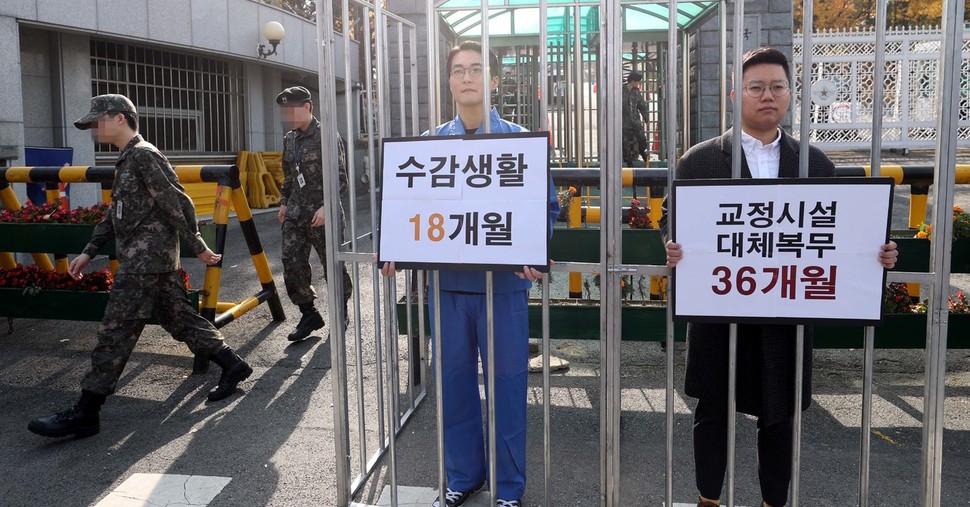Posted on : Nov.15,2018 20:05 KST
 |
|
Conscientious objectors to military service stage a performance protest of the Ministry of National Defense’s punitive approach to alternative service. (Park Jong-shik, staff photographer)
|
The Ministry of National Defense announced on Nov. 14 that it was seriously considering a plan that would assign conscientious objectors to military service an alternative service period of 36 months, or double the length of military service.
An alternative service period amounting to more than one-and-a-half times the term for an active-duty soldier comes across as punitive and is not consistent with the aims of introducing alternative service. The message of the Constitutional Court’s ruling last June is that conscientious objection is a form of freedom of conscience as guaranteed by the Constitution and should not be punished. The ministry’s plans conflict with that judgment from the court and should be reconsidered.
The fact that a service period twice as long as the active duty period represents a human rights infringement can be seen from cases where alternative systems were actually introduced overseas, as well as the recommendations of human rights organizations. In 2008, the Council of Europe’s European Committee of Social Rights voted that the alternative service period should not exceed 1.5 times the service period for armed soldiers. The National Human Rights Commission of Korea also recommends that the period not exceed one-and-a-half times the active duty period.
Most countries that have adopted alternative service – including Germany, Taiwan, Denmark, and Spain – have kept it within one-and-a-half times the active duty period. In Finland, the alternative period is twice as long, but the active duty period is also quite short at six months.
Some argue that assigning a service period twice as long as the active duty period is appropriate in terms of equity with other alternative service personnel such as industrial technicians and public health physicians (34 to 36 months). But it doesn’t make sense to compare alternative service for conscientious objectors with people performing compensated military service in their areas of specialization. Others say the difference is meant to prevent alternative service from being exploited as a way of evading military service. But that is a matter should rightly be resolved through different means, including improving service conditions for active-duty soldiers and introducing rational review systems.
The Ministry of National Defense did the right thing in excluding mine clearing from the list of alternative service activities. But it should also consider expanding service beyond correctional duties to include areas such as firefighting and caring for disabled persons and seniors suffering from dementia. We also should not ignore the recommendations of international organizations that the review committee for conscientious objection to military service be placed under civilian rather than military control.
Please direct comments or questions to [english@hani.co.kr]






